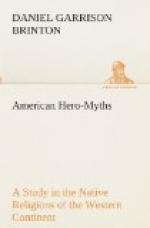They also said that after a certain length of time there re-appeared another like this first one, or else he was the same, who also gave wise counsel and cured the sick. He met disfavor, and at one spot the people set about to slay him, but he called down upon them fire from heaven, which burned their village and scorched the mountains into cinders. Then they threw away their weapons and begged of him to deliver them from the danger, which he did[1]. He passed on toward the West until he reached the shore of the sea. There he spread out his mantle, and seating himself upon it, sailed away and was never seen again. For this reason, adds the chronicler, “the name was given to him, Viracocha, which means Foam of the Sea, though afterwards it changed in signification."[2]
[Footnote 1: This incident is also related by Pachacuti and Betanzos. All three locate the scene of the event at Carcha, eighteen leagues from Cuzco, where the Canas tribe lived at the Conquest. Pachacuti states that the cause of the anger of Viracocha was that upon the Sierra there was the statue of a woman to whom human victims were sacrificed. If this was the tradition, it would offer another point of identity with that of Quetzalcoatl, who was also said to have forbidden human sacrifices.]
[Footnote 2: Herrera, Historia de las Indias Occidentales, Dec. v, Lib. iii, cap. vi.]
This leads me to the etymology of the name. It is confessedly obscure. The translation which Herrera gives, is that generally offered by the Spanish writers, but it is not literal. The word uira means fat, and cocha, lake, sea, or other large body of water; therefore, as the genitive must be prefixed in the Qquichua tongue, the translation must be “Lake or Sea of Fat.” This was shown by Garcilasso de la Vega, in his Royal Commentaries, and as he could see no sense or propriety in applying such a term as “Lake of Grease” to the Supreme Divinity, he rejected this derivation, and contented himself by saying that the meaning of the name was totally unknown.[1] In this Mr. Clements R. Markham, who is an authority on Peruvian matters, coincides, though acknowledging that no other meaning suggests itself.[2] I shall not say anything about the derivations of this name from the Sanskrit,[3] or the ancient Egyptian;[4] these are etymological amusements with which serious studies have nothing to do.
[Footnote 1: “Donde consta claro no ser nombre compuesto, sino proprio de aquella fantasma que dijo llamarse Viracocha y que era hijo del Sol.” Com, Reales, Lib. v, cap. xxi.]
[Footnote 2: Introduction to Narratives of the Rites and Laws of the Incas, p. xi.]
[Footnote 3: “Le nom de Viracocha dont la physionomie sanskrite est si frappante,” etc. Desjardins, Le Perou avant la Conquete Espagnole, p. 180 (Paris 1858).]
[Footnote 4: Viracocha “is the Il or Ra of the Babylonian monuments, and thus the Ra of Egypt,” etc. Professor John Campbell, Compte-Rendu du Congres International des Americanistes, Vol. i, p. 362 (1875).]




